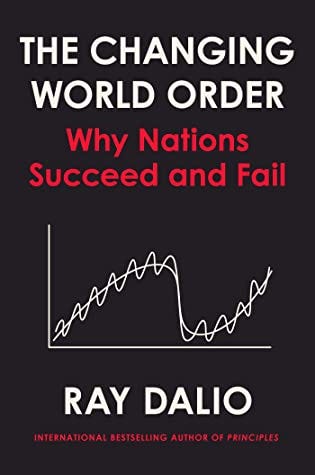The Changing World Order: Why Nations Succeed and Fail by Ray Dalio
If you've seen the meme floating around, "Bad Times Create Strong Men, Strong Men Create Good Times, Good Times Create Weak Men, Weak Men Create Bad Times," you have learnt more than you will from this book. Ray Dalio is a famous investor and now late in his career he seems to have developed the desire to become something of a public sage as well. That in itself is fine but the problem is that he actually has very little that is novel or interesting to say. This book is about the very obvious point that all political units grow, become decadent, and decline. After reaching their peak of strength countries incur too many debts and devalue their currency, then they start facing internal divisions and external challenges, which eventually lead to their downfall. This is such a glaringly obvious thing but for some reason Dalio packages it as a unique never-before-heard insight that is the fruit of decades of learning and consultations with some of the top minds on the planet. The book overflows with groundbreaking insights like “stronger countries will exploit weaker ones” and “growing inequality leads to social tension.” The rest of it is a roundup of historical facts from Wikipedia about the rise and decline of the British, Dutch, and various Chinese empires, all tied into a supposedly grand-unifying theory of 50-75 year cycles in which countries rise and fall. There is absolutely nothing that is original or even expressed in an interesting way.
One thing I will say positively about this book is that it was written in a novel manner whereby the parts deemed important by the author were highlighted in various ways as a way of getting to the crux of his point without getting bogged down with filler. That helped because there was a lot of filler in this book, and arguably the entire thing was a filler. Although the editing style with various bolded sections and red bullet points made it look like a glorified PowerPoint presentation at times, or, more to the point, like an investor briefing document, it does save the reader a lot of time and allowed me to finish a text I would've almost certainly discarded long before. Even with this novel editorial style guiding the way, I still have to say that I learnt absolutely nothing from this book. I did not make one single note on the text, which is unlike me since my books are usually packed with my own writing in the margins by the end. I hope I can return it somehow since I am never going to consult it again for any reason. To be clear, I have no problem with Ray Dalio personally. I don't find him offensive nor do I object to his famously controversial stance on the merits of the Chinese Communist Party. He’s entitled to his opinions and I’m sure there is much to learn from his life experience. Unfortunately I do believe that this book in particular however is the predictable product of a very wealthy person whose courtiers are unable to tell him that he's not as singularly brilliant as his financial success may suggest. It did not need to be written, and it does not need to be read. I’d like to read something from Dalio more about identifying good future investments rather than watching him attempt to reinvent himself as Thucydides or Ibn Khaldun.


I agree that it is a readable restatement of information that is widely available elsewhere. But he does package it in a way that I found not unuseful, even though there were no instances where I said to myself, “ Gee, didn’t know that.” The biggest problem that I had with it is that it poses as a scholarly treatise, but it is more like a review.
A friend of mine recommended this book to me. I read like 25 pages. I'm glad to hear I'm not crazy.